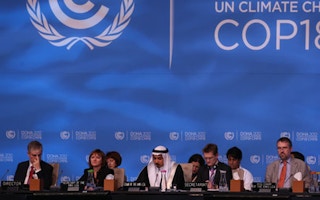Doha, Qatar – The two-week climate change conference concluded on Saturday night, with negotiators agreeing to a second phase of the Kyoto Protocol, the only binding treaty that binds industrialized countries to cut carbon emissions.
The deal dubbed as the “Doha Clita Gateway” was described by Conference of Parties (COP) President Abdullah bin Hamad Al-Attiyah as a “miracle deal” as the process had been exhausting and complicated.
“I must admit that this meeting is a lot complicated. But we did our best. The Doha Climate Gateway, I think, will be of benefit to all countries,” Al-Attiyah said at the closing of the summit among 195 nations, after a marathon 36-hour final session.
The United States, which never ratified the treaty, indicated that it will not join the second commitment. Japan, Russia, Canada and New Zealand have withdrawn their participation in the Kyoto.
On the other hand, the European Union, with its 27 country-members, as well as Australia indicated that they are willing to support the new treaty as long as emerging countries such as China and India will pledge on the table ambitious emissions cuts.
Developing countries also scored an acknowledgement of the adverse effects they face from climate change, winning a pledge from developed nations that they will receive funds to address the “loss and damage” incurred.
This is the first time they have received such recognition and the first time the phrase “loss and damage from climate change” was included in an international legal document.
There was no consensus, however, in the agreement on how to bridge the funding gap from 2013 to 2020. The discussion, it said, will be tackled by next year. Countries are expected to reach a consensus on the finance mechanism of the US$100 billion a year by 2020. The fund is meant to support mitigation and adaptation measures of poorer countries to cope with climate change.
“It was not an easy ride, not a beautiful ride, and it was not a fast ride,” said European Climate Commissioner Connie Hedegaard during the closing of the talks. “ But we managed to cross the bridge and hopefully we can increase our speed.”
Developing countries, however, expressed that the Doha climate talks did little progress as it failed to convince rich countries to be on-board to the second phase of the Kyoto Protocol, and failed to bridge funding gaps and mechanism on financial aid.
“Finance and mitigation are deeply deficient. We are not talking about impacts on how comfortable people will live, but whether our people will live. Much, much more is needed if we are really going to address climate change and reduce emissions,” said Nauru’s Minister Kiere Keke.
The deal was also immediately criticized by leading civil society organizations calling it as a “weak deal.”
“Rich countries failed to deliver for the people living in poverty who are most vulnerable to climate impacts. These countries have committed to deliver funds to help developing countries adapt to and mitigate climate change. But they are not delivering what is needed,” said Brandon Wu, Senior Policy Analyst of US-based non-government organization ActionAid.
The climate talks ended announcing that the next climate change summit will be in Poland in 2014.








